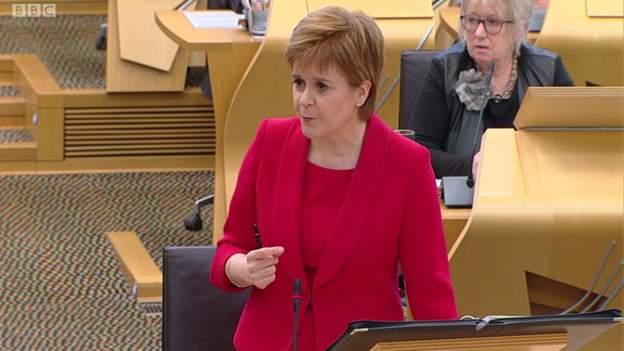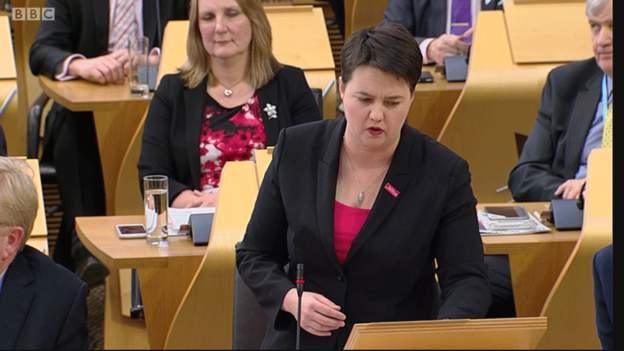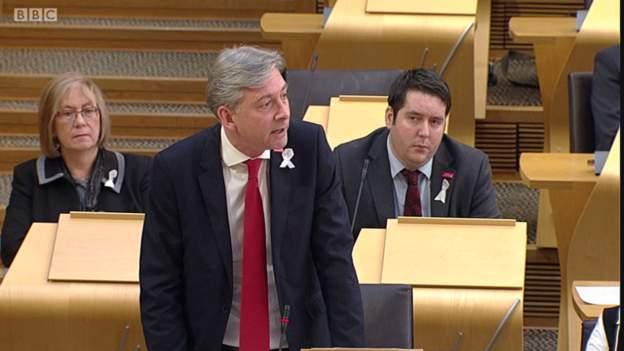A day of restraint at Holyrood
- Published

Nicola Sturgeon will need the support of an opposition party to pass her government's budget
It was a day, mostly, characterised by restraint. Again, for the most part, that mood was driven by external circumstances.
There are, however, always exceptions. Nicola Sturgeon still found space to chide Labour's Richard Leonard for what she felt was "empty rhetoric".
But to the subjects where constraint was evident. Ms Sturgeon was pursued by Ruth Davidson of the Tories anent the Named Person legislation.
Ms Davidson reckoned the bill was now in a mess, having been thwarted from progress by parliament's education committee who wanted more details on practical operation and, in particular, on the draft code of guidance.
The plan, you may recall, is to identify an individual Named Person to monitor the wellbeing of every child and young person in Scotland.
Critics tend to fall into two camps. Some are simply agin the legislation full stop, regarding it as unwarranted intrusion. Others are potentially supportive but want clarity of information.
Ms Davidson wanted the first minister to dump the bill and start again. Ms Sturgeon declined - but did so moderately and modestly.

Ms Davidson urged the first minister to start again on the named person scheme
She knows the legislation is in trouble. She knows that diplomacy is more likely to prevail than stridency. So she sought to assuage concerns.
With Patrick Harvie of the Greens, there were different motivations. Mr Harvie was complaining about rail fare increases, arguing en passant that a non-profit system could have released sufficient resources to cut fares.
Again, Ms Sturgeon stepped carefully. She acknowledged gently that folk don't like paying more. (Tax increases might have been in her mind, I feel.)
But she also knew that her options were limited, relying upon noting that her government had ensured that a public sector tender might be advanced for the next round of franchises.

Ms Sturgeon accused Mr Leonard of deploying "empty rhetoric" on poverty
Furthermore, she has to be polite to Patrick Harvie. She will need his party's votes to secure support for the Scottish Budget when it is unveiled next week.
Then there was Willie Rennie of the Liberal Democrats. He launched into a tirade about Brexit and the "pitiful" progress or lack of it under the stewardship of the prime minister.
Mr Rennie wanted a second EU referendum, upon the emerging terms of the deal. Once again, Ms Sturgeon was notably cautious.
She happily endorsed Mr Rennie's low opinion of the PM, lampooning her as falling into her soup during Monday's Euro-lunch when it became clear that the DUP would not wear the agreement as it affected Northern Ireland.
But she declined, repeatedly, to follow Mr Rennie down the path of a second referendum. A time might come, she noted as she has done previously, when plans for such a plebiscite might become persuasive. Just not now.
Why? The reason offered was that the immediate focus should be upon securing membership of the single market and customs union, rather than rerunning the referendum.
Particularly angry
Other reasons occur. Firstly, Leave voters tend to get particularly angry when it is suggested that the UK's verdict might be overturned. Many SNP supporters were also Leave voters.
Secondly, it is not immediately evident what the impact - or outcome - of a second referendum might be.
Would it really produce a different result or would Leavers be massively motivated to turn out again? If the UK rejected the terms, does that end Brexit - or would it mean that Britain departed without a deal?
Thirdly, Ms Sturgeon has innate caution in this field. She knows she has to proceed carefully with regard to a possible second referendum on independence.
Indeed, she made a sklenting reference to this in her response to Mr Rennie. And so she is comparably cautious about EURef2.
Which brings me finally to Richard Leonard. The Labour leader painted a picture of a "Dickensian Scotland". But it was more Hard Times than Pickwick. It was the grim opening chapters of Christmas Carol, not its closing joys.
He built a case, as he has done in recent weeks, for higher public spending in Scotland. As in previous exchanges, he offered little in the way of details as to how he would fund this.
But then that isn't his task, at the moment. His objective is to characterise the UK Conservatives and the SNP as equivalent, each intent on cutting services.
Ms Sturgeon responded by insisting that her government had allocated resources fairly within limits, while advising Mr Leonard to await next week's Budget, which is likely to increase taxation in Scotland.
As well as politics, then, it is a matter of arithmetic. The Micawber principle relating to expenditure and income.
Unfortunately, Ministers who have to produce a budget cannot simply rely on Mr Micawber's firmly expressed belief that "something will turn up". They have to act.